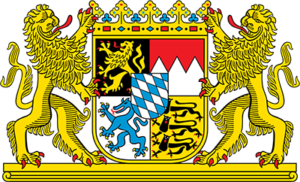LMU Hospital’s annual reception returned this year with exciting topics and a multimedia “magic show”
The programme of the reception skilfully bridged the gap between tradition and innovation, digital progress, and humanity.
May, 2023
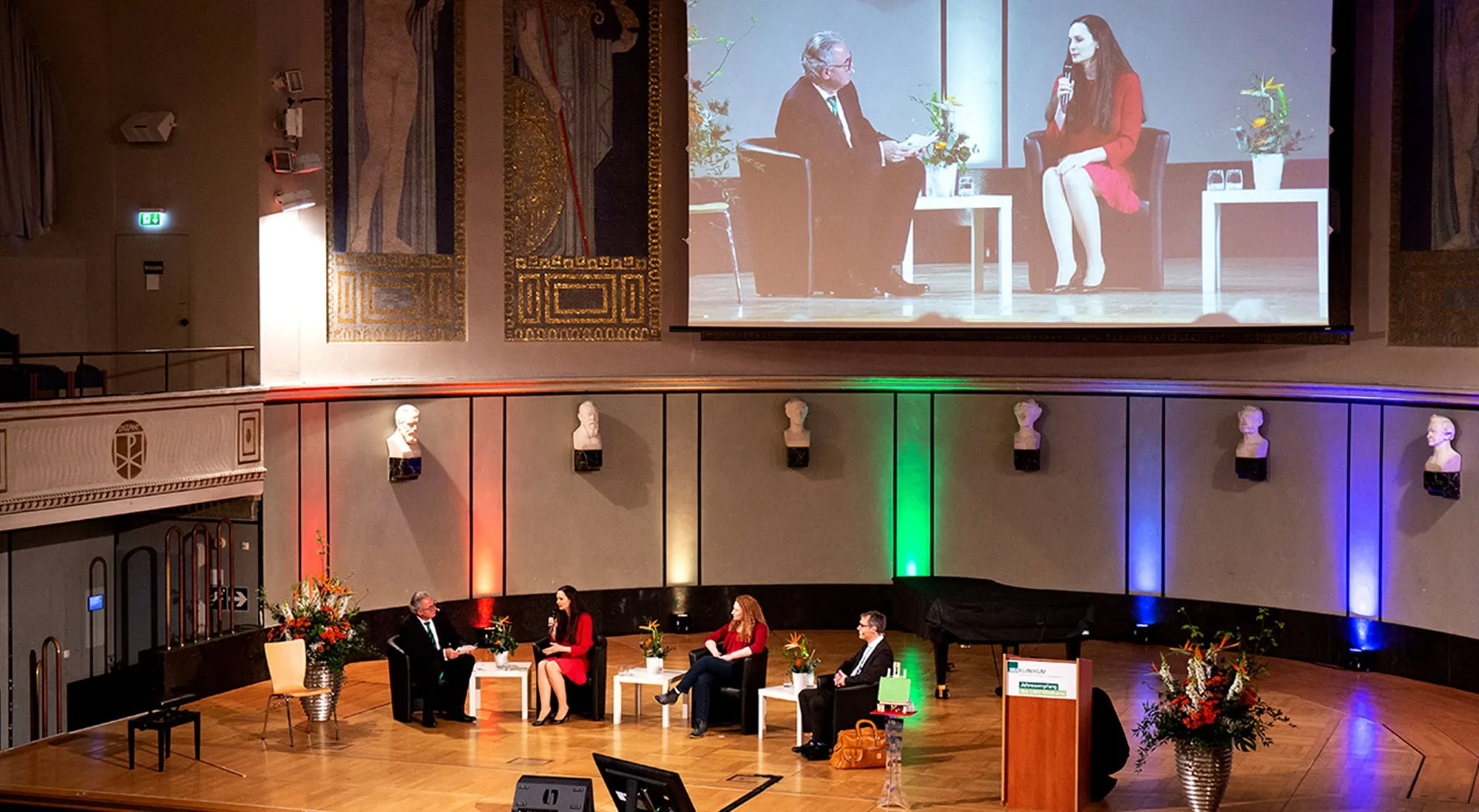
©LMU Klinikum
Panel discussion: Prof. Markus M. Lerch, Medical Director LMU Klinikum Großhadern, Prof. Dr. Daniela Hartmann, Senior Physician and Dermatosurgeon at the LMU Dermatology Clinic, Dr. Marlene Heckl, Assistant Physician at the LMU Psychiatric Clinic and science blogger, Prof. Dr. Berend Feddersen, Head of Specialised Outpatient Palliative Care (SAPV) at the LMU Clinic for Palliative Medicine. (f.r.t.l.)
“LMU Hospital can commit to the cutting edge: it has substantial tradition while at the same time it is always cutting-edge, always moving with the times-“
Markus Blume, Bavarian State Minister for Science and Art
Digitisation, empathy and the tension between society and science – these were some of the facets of medicine discussed at the LMU Hospital’s annual reception held on 2 May 2023. After a three-year break due to the Corona pandemic, the traditional event was once again held in the LMU’s auditorium. The programme included a lecture by astrophysicist and science communicator Harald Lesch on the topic of “Society and science – a misunderstanding?” and a panel discussion entitled “University medicine – between digitalisation and empathy”. Around 600 guests attended this year’s event, including Science Minister Markus Blume, personalities from society, politics and science, as well as staff and supporters of the LMU Hospital.
“It has been a challenging three years,” said Prof. Dr Markus M. Lerch in his welcome address; these challenges were made clear with figures: 6,500 corona patients were treated as inpatients at the LMU Hospital, 1,000 of them in intensive care units and 100 on ECMO. Early on, he said, LMU Hospital had “thrown itself into the breach in the University Medicine Network to research the new disease”, with support from the Free State of Bavaria and the Federal Ministry of Research, among other sources. Doctors and scientists have so far published more than 1,080 papers on the subject of the coronavirus. In the Corona pandemic, the LMU Hospital was thus a central pillar of health care. In connection with the war in Ukraine, the LMU Hospital has not only organised several fundraising measures to date, but has also created treatment offers for the severely injured, cancer patients and refugees in Munich.
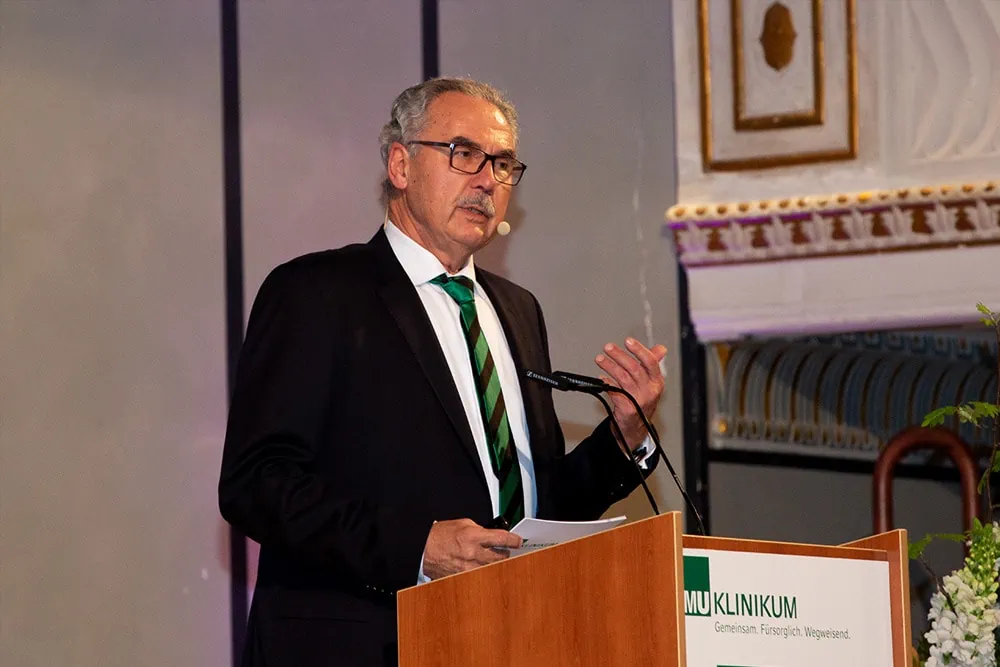
©LMU Klinikum
Anual reception LMU clinic 2023 – Prof. Dr. Markus M. Lerch
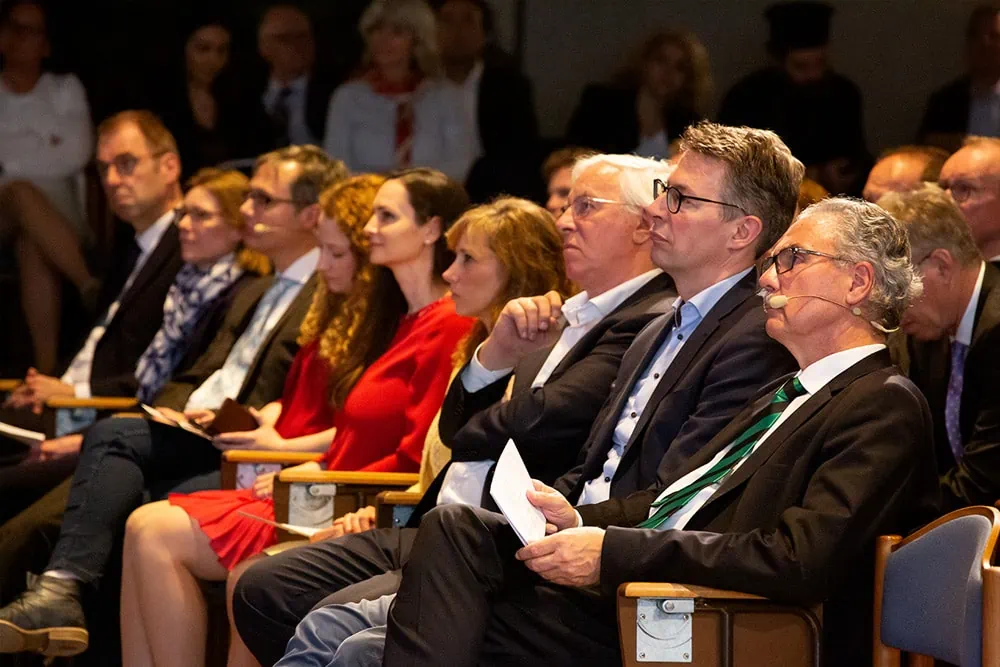
©LMU Klinikum
Guests of the anual reception 2023 LMU clinic
A beacon for the Munich region
In addition to the upcoming construction projects and the Hospital Reform Act, Lerch also mentioned the topic of sustainability as a major challenge for the future: for example, the LMU Hospital wants to reduce energy consumption by around 16 percent by 2025 through various measures and at the same time increase renewable energy by 900 percent by 2027 through the expansion of photovoltaics. The focus is also on expanding cooperation with the LMU Hospital’s partners: joint structures and processes are to be set up with the Munich universities, the Hospital rechts der Isar and the Helmholtz Centre Munich throughout the Isar region. A joint research data integration and a study centre are to be created as a “beacon for the Munich region”. “The situation evolved from competition to cooperation, especially in the clinical research area,” Lerch concluded in his speech.
Pairing digitalisation with empathy
In his speech, Science Minister Markus Blume named three points that made the LMU Hospital stand out for him during his time in office: it can celebrate, as it proved at the events celebrating 550 years of LMU Medicine, 175 years of the Hauner Children’s Hospital and the ground-breaking ceremony for the New Hauner. Blume described the university hospitals as the “backbone of care in Bavaria and in Germany” during the Corona pandemic: “They can cope with crises and they are also getting through current crises, not least thanks to the support of the federal government and the Free State.” In addition, he said, LMU Hospital has shown “that it can commit to the cutting edge”: it has “substantial tradition” while at the same time it is “always cutting-edge, always moving with the times”. Digitalisation is needed for the future, Blume demanded, “not only in the top medical institutions, but everywhere. However, this must be paired with empathy, because “there are things in the hospital sector that cannot be replaced digitally”. These cannot necessarily always be learned academically. In the end, it is the staff that is the decisive factor: that’s why we’re doing everything we can to support staff, doing even more for training in the future.” This includes not only university education, but also vocational training.
Maximum attention for each patient
The Vice President of the LMU, Prof. Francesca Biagini, thanked all the staff at the LMU Hospital: almost half a million patients come there every year, “but each person is treated with maximum attention”. Biagini also addressed the diversity of the staff at the LMU Hospital: “In addition to German, 121 other languages are spoken, most frequently Serbo-Croatian, Italian and Turkish,” she said. Close to one third of the nursing staff come from abroad. This diversity of staff poses many challenges, she said, but enriches the hospital immensely. “Thank you for finding your way to us, to support the LMU Hospital with your work and to make it even better,” she said.in Munich. Please visit www.lmu-klinikum.de for further information.
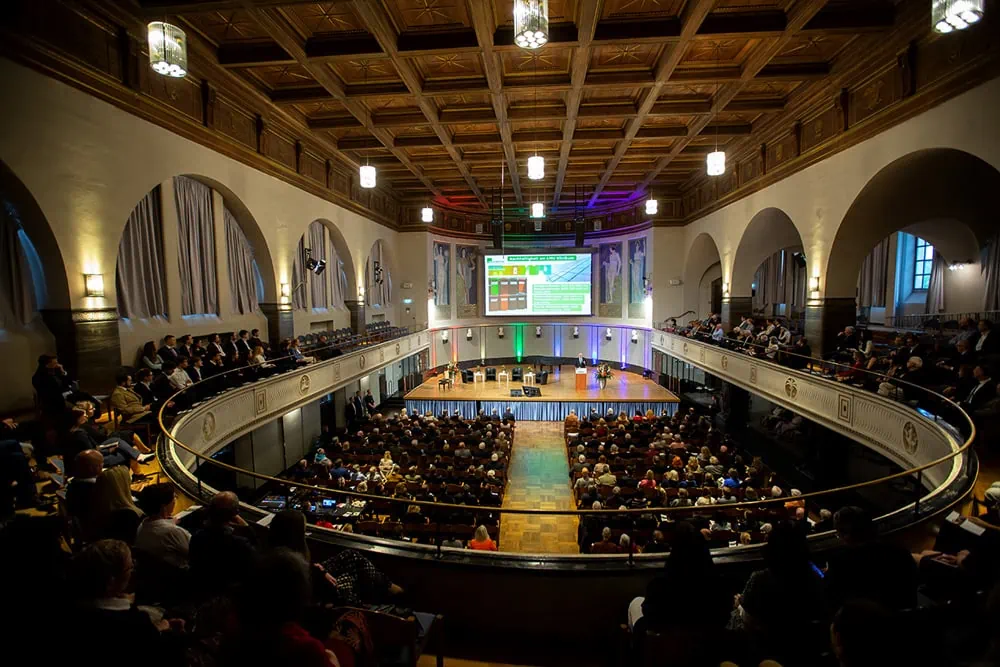
©LMU Klinikum
Anual reception 2023 LMU clinic
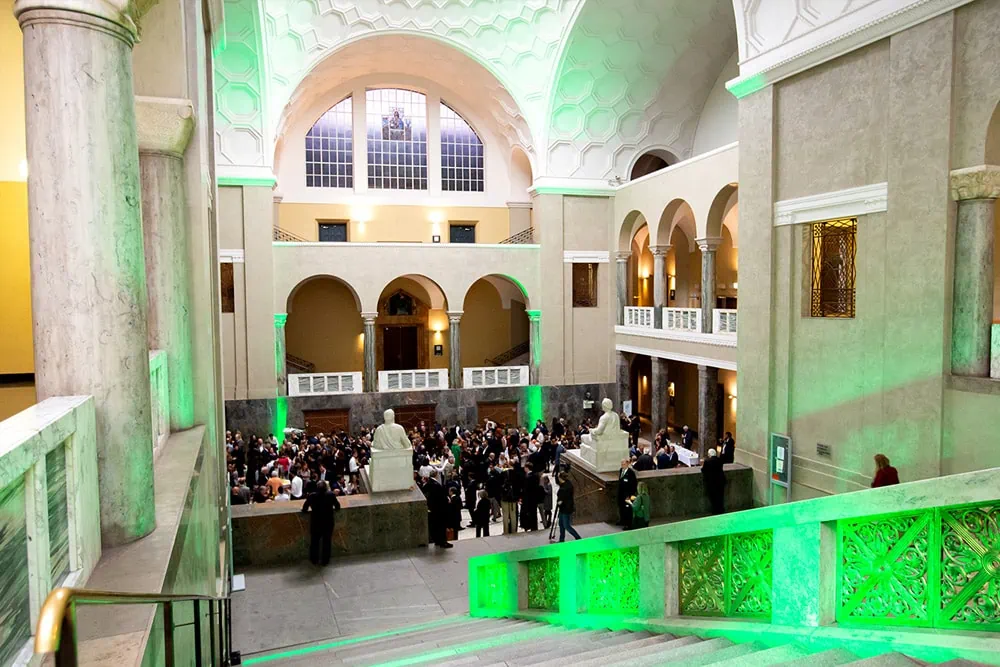
©LMU Klinikum
Anual reception 2023 LMU clinic
Society and science – a misunderstanding?
Harald Lesch, astrophysicist at the LMU and science journalist, explained in his lecture that science is more than the implementation of new scientific findings into the feasible and also referred to Ulrich Beck and Hannah Arendt. Critical thinking must not be replaced by mere knowledge. Otherwise, we would no longer reach people with research and science and they would lose confidence. This is precisely the reason why alternative truths and fake news are becoming increasingly widespread. “The natural sciences have become so abstract that it takes a huge amount of translation work to make them comprehensible enough to be discussed at all in the social and political sphere,” Lesch said verbatim. He described medicine as “a very special science” because it is a social natural science, dealing with the nature of a human being in a social environment. He said that those who practise medicine have also noticed how much the mistrust of some has disturbed the relationship between science and society. “Maybe we can get out of this now if we manage to hear open words, but also to give open words to society,” he expressed. He added that only the cooperation of society and science can make a prosperous future possible.
University medicine between digitalisation and empathy
The final panel discussion dealt with the different facets of digitalisation and empathy: Prof. Daniela Hartmann, senior physician and dermatosurgeon at the Department of Dermatology, presented the opportunities of AI in medicine using the SKIN-ID software. With this software, tissue samples taken during an operation can be analysed in real time using artificial intelligence (AI). “AI helps us to become better, but the human being remains responsible,” Hartmann summarised. The use of apps in psychiatric treatment was presented by Dr Marlene Heckl, assistant physician at the Psychiatric Clinic and science blogger: after inpatient treatment, patients could access digital health apps that could accompany and stabilise them while waiting for an outpatient therapy place. A stuffed rabbit played the main role in the multimedia “magic show” by Prof. Dr. Berend Feddersen, Head of Specialised Outpatient Palliative Care (SAPV) at the Clinic for Palliative Medicine. Using the stuffed animal, he humorously demonstrated the possibilities and impossibilities of using AI in palliative medicine: for example, as an emotional companion for patients or in the training of trainee doctors in radiology.
See more here: video of the panel discussion
About LMU University Hospital Munich
The LMU University Hospital is one of the largest university hospitals in Germany and Europe. Every year, around 500,000 patients trust the competence, care and commitment of 11,000 employees in over 50 specialist clinics, institutes and departments. Outstanding facilities of the LMU University Hospital include the oncological center CCC M and Bavaria’s largest transplant center TxM. The LMU University Hospital is represented in all German centers of health research. The Medical Faculty of Ludwig Maximilians-University Munich and the LMU University Hospital make a significant contribution to the excellence strategy of the Ludwig Maximilians University in Munich. Please visit www.lmu-klinikum.de for further information.
- Marchioninistraße 15
- 81377 München
- Phone: +49 (0)89/4400 – 72101
- ed.nehcneum-inu.dem@greb.aidualc
- www.klinikum.uni-muenchen.de
